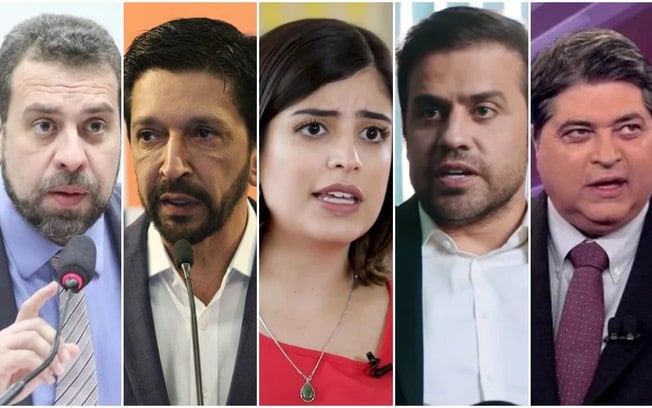Datafolha Research released last Thursday (22) on the race for the City Hall of São Paulo reveals a three-way technical tie between federal deputy Guilherme Boulos (PSOL), with 23%, influencer Pablo Marçal (PRTB), with 21%, and mayor Ricardo Nunes (MDB), with 19%.
Then appear the presenter José Luiz Datena (PSDB), with a retreat from 14% to 10%, and the federal deputy Tabata Amaral (PSB), who went from 7% to 8%, in a technical tie.
The iG Portal analyzed the government plans of these five candidates. See what each one thinks about the following topics:
Public Security
Guilherme Boulos: The psolist intends to double the number of agents of the GCM (Metropolitan Civil Guard), which today has 7,000. According to the plan, he should also launch the Municipal Pact to Combat Violence against Black Youth and the Network to Combat Violence and LGBTphobic Discrimination.
Boulos also wants to place a GCM vehicle at the door of each municipal school at the entrance and exit of students, in addition to establishing patrols in the surroundings at intermediate times.
The candidate also spoke of a task force against stolen cell phones. Through municipal inspectors, he wants to expand inspection in businesses that sell stolen or stolen devices and act in partnership with state and federal agencies.
On violence against women, the idea is to expand the Maria da Penha Guardian Patrol, of the GCM, with decentralization of the bases. Boulos also spoke of increasing access to rent assistance for women who are victims of aggression, abuse and threats.
Ricardo Nunes: The current mayor of São Paulo also intends to increase the number of officers of the Metropolitan Civil Guard and modernize equipment, in addition to reorganizing the territorial structure so that there are more guards in the periphery.
Regarding security in schools, Nunes intends to increase the presence of the Municipal Civil Guard in educational places, in addition to the school patrol.
The MDB affiliate also wants to expand the city’s video surveillance with integration of information systems.
Pablo Marçal: The candidate intends to establish the “Guard in the Neighborhood”, which consists of the GCM having “functions outside its scope” removed, with more action in the neighborhoods.
Marçal’s government plan does not specify what these functions would be or who would take the place of the GCM. In addition, the candidate proposes to increase the number of Guards, which would reach 21 thousand officers, tripling the current number.
Datena: The PSDB candidate says he will strengthen the GCM with lethal and non-lethal weapons, use of cameras, training and salary readjustment, “putting [the GCM] at the level of the other police forces.”
The toucan also wants to expand the Delegated Operation, in which agents reinforce policing on their days off.
Datena promised to expand the operations of the Guardian Maria da Penha patrols, which are dedicated to the protection of women victims of violence. However, the candidate did not provide details on how he intends to strengthen the program.
Tabata Amaral: The candidate proposes the implementation of an integrated approach that combines health, social assistance, public security and urbanism in Cracolândia. It promises to offer specialized care in chemical dependency and mental health, as well as strategies for housing and social assistance. The plan also includes the fight against organized crime through intelligence and data analysis, in collaboration with the state government.
Tabata also presents the creation of Restorative Justice Centers, which would be responsible for immediately judging drug-related crimes in the central region.
The PSB affiliate also intends to establish an electronic system to connect the Metropolitan Civil Guard to the Judiciary. This system would have the objective of identifying people who do not comply with judicial measures and ensuring that the sanctions imposed are complied with.
Education
Guilherme Boulos: The candidate proposes to gradually implement the offer of cultural, sports and leisure activities in the after-school period. In addition, the program aims to make schools available on weekends. It is also planned that each school will have a psychologist to assist students, families and teachers.
Boulos’ campaign also promises the construction of at least 22 new CEUs (Unified Educational Centers), totaling 80 units.
Ricardo Nunes: The emedebista promises that, in four years, all preschool students will have access to full-time education. The program also intends to expand full-time education to elementary school, with a focus on more vulnerable neighborhoods.
In addition, Nunes undertakes to complete the construction of five new CEUs, which are already contracted through public-private partnerships.
He also includes in the plan the installation of “bebetecas” (spaces dedicated to early childhood) in all 58 CEUs in the city.
Pablo Marçal: The candidate proposes the implementation of a performance-based remuneration system for teachers in the municipal network. The proposal includes rewards linked to attendance and achievement of learning goals, as well as bimonthly assessments to identify deficiencies in teaching.
Marçal also plans to encourage an “entrepreneurial mindset” and integrate entrepreneurship and finance subjects into the school curriculum. In addition, it proposes the creation of a technical training program for young people from the age of 14, aiming to prepare them for the job market.
The PRTB candidate also promises the creation of schools dedicated to Olympic sports, with the aim of training high-performance athletes.
Datena: The journalist says that he is committed to ensuring the literacy of children up to the age of eight and proposes the presence of two teachers in the classrooms during the first years of elementary school to achieve this goal.
For municipal daycare centers, he suggests extending opening hours by two hours, allowing working parents to leave their children longer.
The candidate plans to increase the number of full-time schools, which currently represents only 7% of the network. In this format, students will have five meals a day and access to professional courses, in addition to game and language classes in the complementary period.
Tabata Amaral: If elected, Tabata promises to teach 100% of children to read and write at the right age, with priority for literacy in Portuguese and mathematics by the age of 7. She also proposes a tutoring program, with tutor or assistant accompaniment for students in need.
Tabata also wants to expand the opening hours of daycare centers until 7 pm, in addition to adopting a new system of quality indicators in the municipal network, including the affiliated units.
Health
Guilherme Boulos: Boulos’ plan speaks of a “health poupatempo”, which aims to eliminate queues for exams and consultations, with the creation of 16 units inspired by the Poupatempo model. This state model already integrates several services in a single place, facilitating scheduling and service.
The candidate also proposes the hiring of doctors for specialty areas with high demand, aiming to improve coverage and care.
Boulos also promises to ensure the immediate availability of medicines throughout the municipal health network, optimizing the acquisition, distribution logistics and supply of pharmacies.
In the plan, he also talks about the creation of new CAPs (Psychosocial Care Centers), the intensification of the inspection of health contracts and the establishment of quality goals.
Ricardo Nunes: The current mayor of SP wants to include the construction of three municipal centers dedicated to ASD (Autism Spectrum Disorder) in the south, east and west regions, in addition to the creation of more than 200 decompression rooms in public spaces for people with this disorder.
Also, according to the plan, the Casa Mãe Paulistana – Pessoa com Deficiência will be implemented, aiming to offer specialized support.
He also promises a program that will focus on home visits, educational campaigns and preventive actions, also covering mental health.
The proposal also aims to expand telemedicine, consolidate the use of electronic medical records, and invest in artificial intelligence to improve diagnoses.
Pablo Marçal: The entrepreneur proposes the renovation and maintenance of sidewalks to improve safety; collaboration between Sports Centers, Basic Health Units and Family Health Units to promote physical activities among the elderly; the creation of green areas and spaces for the practice of physical and sports activities within hospitals; and an integrated digital medical record for patients, using artificial intelligence to manage exam results, among others.
Datena: The PSDB candidate promises to extend the opening hours of health units by at least two hours, until 9 pm, and to ensure that at least one health unit in each sub-prefecture operates 24 hours a day.
Another proposal is to allow the scheduling of appointments through cell phones, eliminating queues at UBSs (Basic Health Units).
Datena also intends to launch the Medicine at Home program, which will offer the delivery of medicines to those who need it most, although he did not specify who the target audience will be.
With regard to oral and mental health, the candidate intends to form partnerships with social organizations to increase the availability of offices, dentists, doctors, therapists and psychologists. He also plans to expand municipal reference centers for ASD.
Tabata Amaral: The candidate promises to expand the coverage of the Family Health Strategy to 75%.
Tabata also intends to create a program that extends the hours of service in health units located close to high-capacity transport systems, such as subways and trains.
In schools, she intends to increase educational activities on hygiene, vaccination status and prevention of drug use.
On mental health, she talks about the creation of psychiatric wards in general hospitals and the expansion of CAPS, with a focus on patients with severe and persistent mental disorders.
The candidate plans to use technology and artificial intelligence to manage queues, send appointment reminders and carry out vaccination campaigns. She also intends to increase transparency in relation to the queues for exams, consultations and procedures.
Want to stay on top of the main news of the day? Join our WhatsApp channel and our Facebook community.


